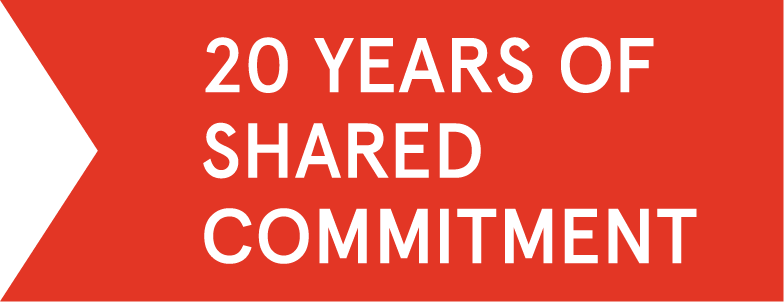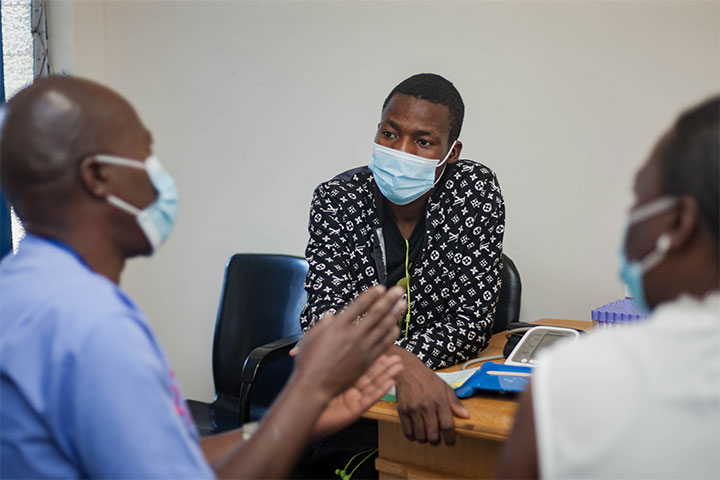After a gratifying prior year, 2021 was also very successful indeed despite the ongoing Covid-19 pandemic with income of CHF 7.9 million (up 11.3 %). CHF 2.4 million of this stemmed from ordinary donations (up 4.3 %). This very good result was possible because we were again able to count on the great loyalty of our donors. The foundation also received a mixed donation in the form of a property. At around CHF 875,000, earmarked donations saw a year-on-year increase of 4.2 %, while donations in kind declined slightly to around CHF 1.5 million (down 6.3 %). In the year under review the Swiss Agency for Cooperation and Development (SDC) provided Newlands Clinic with funding of CHF 1.83 million — CHF 1.8 million from the funding agreement and CHF 32,000 from the food aid project, now complete.
Project expenditure remains stable
Total expenses came to CHF 6.6 million, the prior-year level. CHF 5.8 million or 88.6 % of this flowed directly into projects (compared with CHF 5.8 million or 90 % in 2020). While expenses for Newlands Clinic remained stable at CHF 5.1 million (up 1 %), expenses for the Training Centre (down 8 % to CHF 482,000) and the Women’s Health Centre (down 11 % to CHF 289,000) declined. The main reason for these lower project expenses was the pandemic, which did not permit all the planned activities.
Increase in general expenses
Administration, fundraising and communi-cations expenses increased 11.6 % to CHF 752,000, which is 11.4 % of total expenses (versus 10.4 % in 2020). Administration costs amounted to around CHF 457,000 (up 0.6 %), with expenditures on fundraising and communications totalling around CHF 295,000 (up 34.4 %). The reason for this is that after a restrained year, fundraising measures were stepped up again. Financial and non-operating income The positive development of the financial markets led to an increase in financial income (up 24.8 %). The real estate income is the result of the mixed donation. A condition of this mixed donation is that we pass on a third of this income and any subsequent sales proceeds to another charitable organisation.
Balance sheet and annual profit
The income surplus increased current assets to CHF 25.7 million (up 4.3 %), CHF 15.9 million of which came from securities. Organisational capital totals CHF 26.2 million and designated capital CHF 18 million, as before. The HIV treatment which patients need their whole life long can thus be assured over the longer term. The profit and loss statement closed with an income surplus of around CHF 1.3 million. The positive development of the financial markets is reflected in financial earnings, resulting in a profit before capital allocation of around CHF 1.9 million. Annual profit after capital allocation of CHF 100,000 to increase fluctuation reserves came to CHF 1.8 million.
Financial statements for Zimbabwe
The local organisation Ruedi Lüthy Foundation Zimbabwe ensures the smooth running of Newlands Clinic, while Ruedi Lüthy Foundation provides the necessary funding. The accounts of Ruedi Lüthy Foundation Zimbabwe, the Training Centre and the Women’s Health Centre were audited by Grant Thornton in Harare, and have been consolidated in the present financial statements.
Organisation and remuneration
The members of the Board of Trustees (see p. 15) work in an honorary capacity and are elected for a term of four years; repeated reelection is permitted. They are responsible for the strategic management of the foundation and for managing the assets. The salaries and fees of the CEO and Deputy CEO totalled around CHF 179,000, including employer contributions. Of this, CHF 78,000 fell to project expenses and CHF 101,000 to general expenses.
Outlook
Given the unstable situation in Zimbabwe and the pandemic it is again difficult to predict how costs will develop in 2022. However, our community of extraordinarily loyal donors gives us the necessary security for the future.


